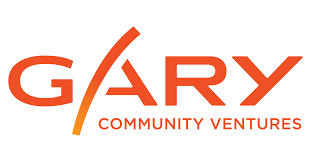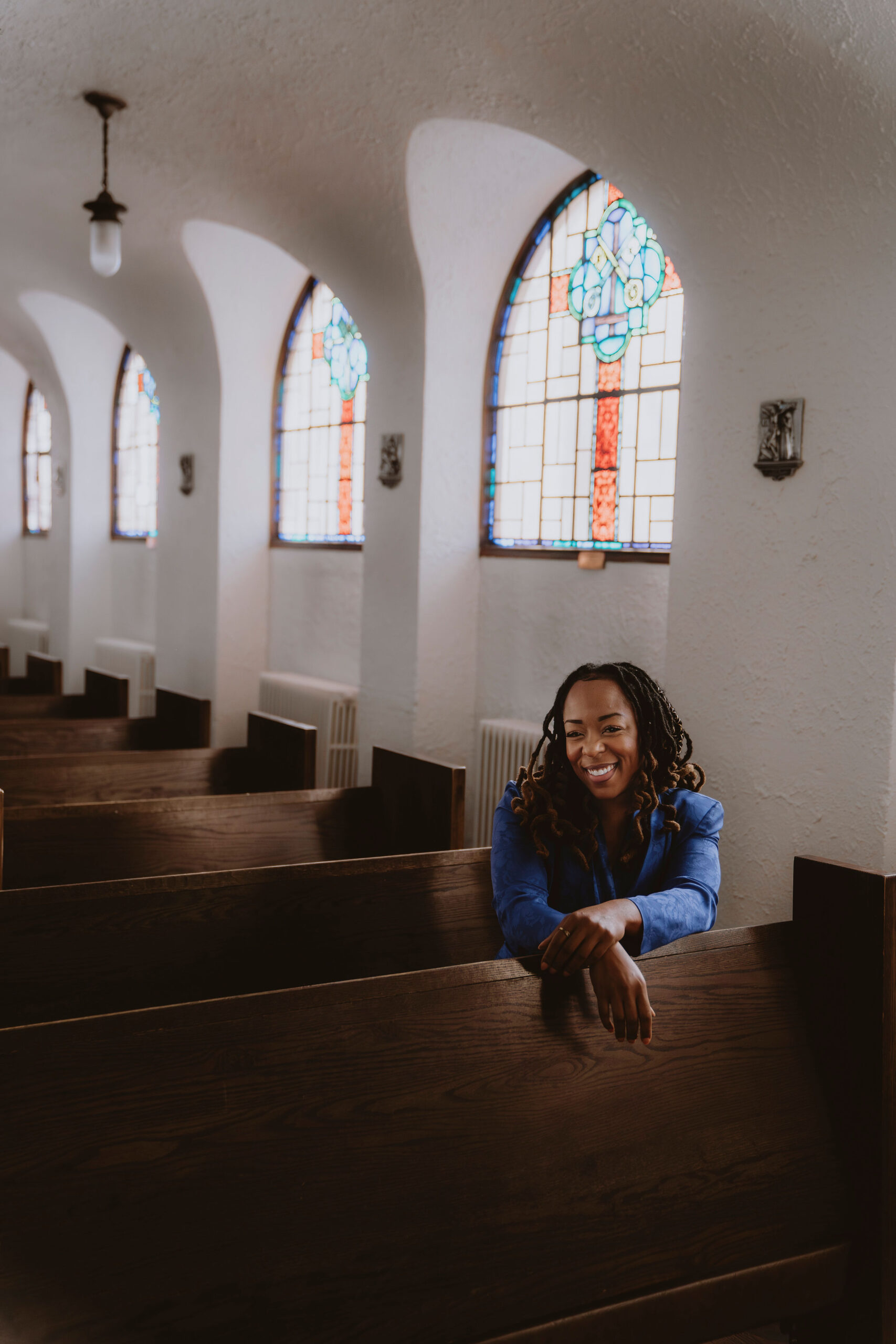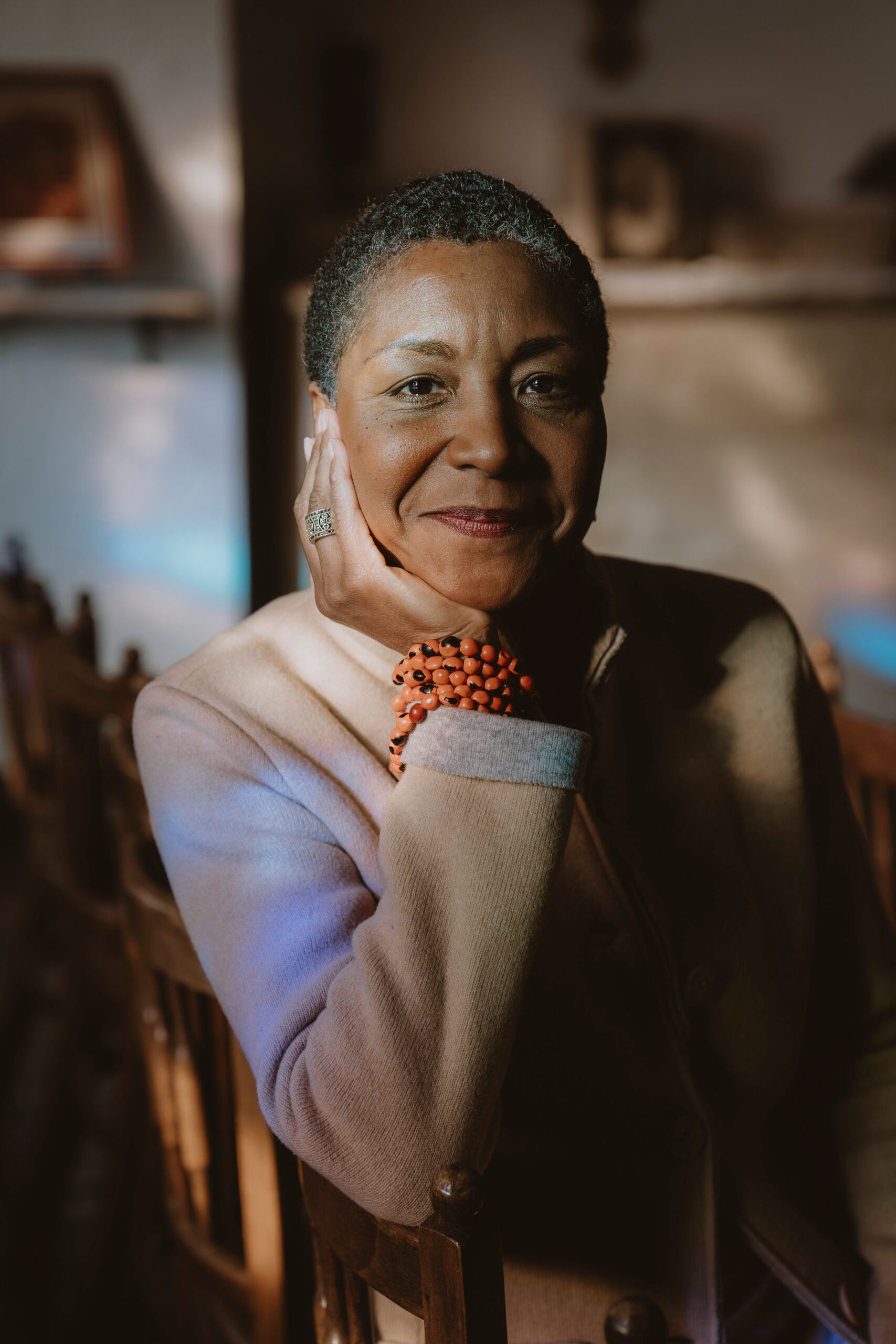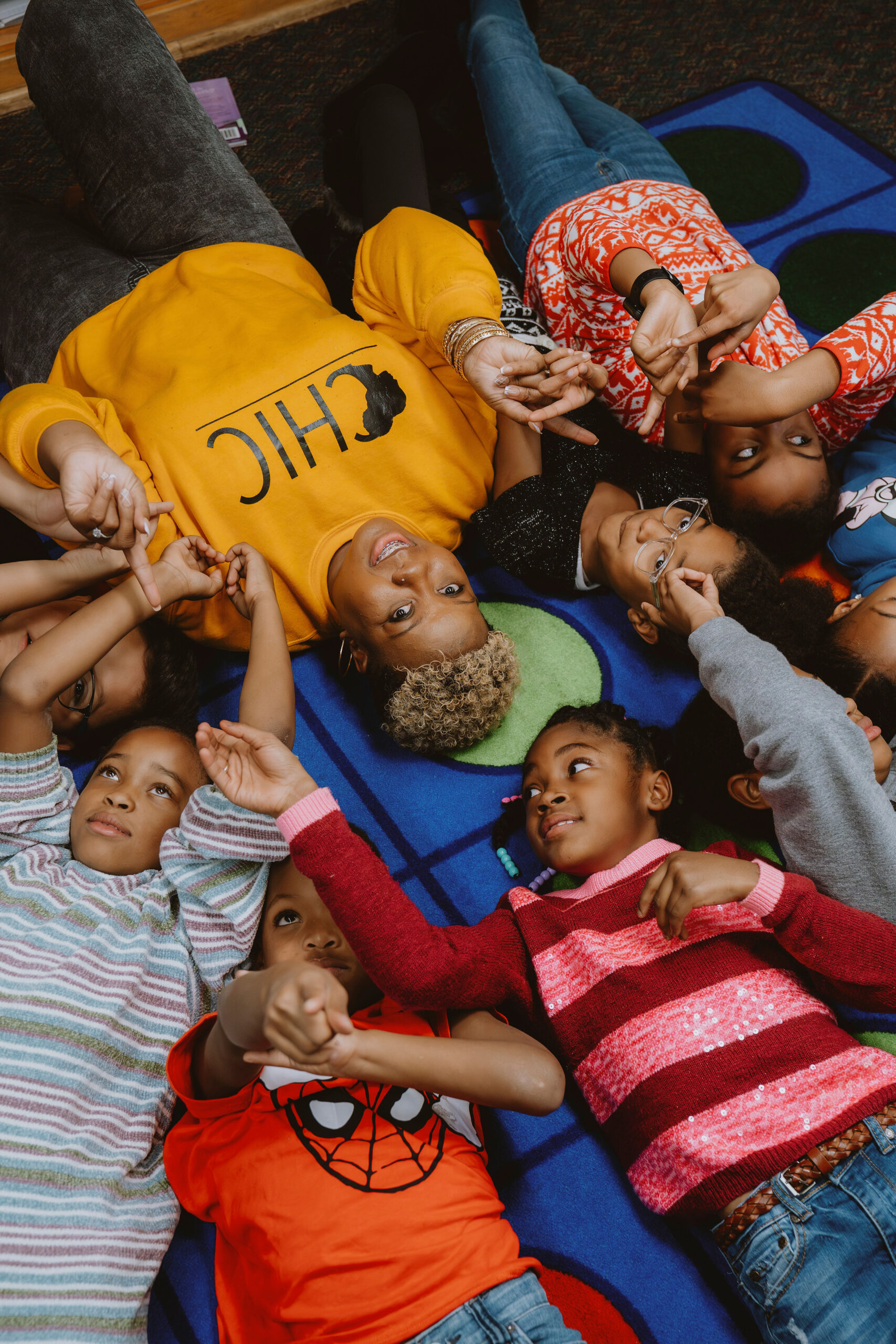ORGANIZATIONS & Institutions
Collaborative Healing Initiative Within Communities (CHIC)
The impacts of racism on Black Coloradans aren’t abstract. An ongoing legislative study seeks to provide equally tangible solutions.
—
By Will C. Holden
Contributing writers: Katherine Casey & Brian Firooz
Editors: Chyrise Harris & Jill Hawley
Photography: CierraAnn Media & Mimarie Creative
Creative Director: Algernon Felice Jr.
“It is not taboo to fetch what is at risk of being left behind.”
According to Berea College scholars, this is the translation of the African word Sankofa, a practice originated by the Akan tribe in Ghana.
The concept is simple: Studying the past informs our present realities and provides the potential for more enlightened future pathways.
The past, present and future were ever-present on Sade Cooper’s mind as she stood shoulder-to-shoulder with leaders from Colorado’s Black community at the Blair-Caldwell African American Research Library in December.
Cooper is Co-Founder and CEO of the Collaborative Healing Initiative within Communities (CHIC). Her team assembled the group at Blair-Caldwell to announce a legislative effort that would equip a research commission to examine how past and present racial injustices have been codified in state and local laws, codes, ordinances and systems. The commission would also provide findings about how these laws, codes, ordinances and systems have impacted Black Coloradans economically and socially. The study also intends to expand the search for solutions, resulting in future recommendations for policy proposals to close Colorado’s widening racial gaps and disparities.
CHIC’s mission is to help families build generational legacies of health and wealth through education, workforce development, community organization and community reentry programs. So leading the push for this legislative study was a natural fit.
Cooper and her team are now working to build a strong coalition to ensure a pathway to passing the study. The hope is to pay for the study through gifts and donations to ensure the state’s tight budget doesn’t prevent passage of the bill, which was introduced in January 2024.
The press conference announcing the study was a seminal moment for Cooper, and she worked hard to stay present in that moment. And yet, that one lingering thought connecting past, present and future continued to reverberate through her brain.
“We are our ancestor’s wildest dreams.”
She has Benny Samuels to thank for that.
Benny Samuels of the Aya Foundation, left, and Sade Cooper of CHIC pose inside Saint Thomas Episcopal Church in Park Hill
Photography & Design: CierraAnn Media & Mimarie Creative, Venue: Saint Thomas Episcopal Church
Meet Benny Samuels
Samuels is a community advisor for CHIC and the current Executive Director of the Aya Foundation. She’s had a long and storied career in communications and community organizing, which included stops at the nationally renowned Karsh Hagan ad agency, Denver Health, Denver Human Services and the Rose Community Foundation. She’s also a veteran Sankofa practitioner, so to her, studying and learning from the oral tradition of those with lived experience is the best way to understand its present day impacts and the potential for a different future.
While the ongoing legislative study will be precise and led by professional scholars, Samuels stressed that one doesn’t need an advanced degree to practice Sankofa. Case in point? On a recent trip home to her home country of Panama, Samuels was presented with a transformative opportunity to study her own past as she was attempting to buy a coconut from a passing produce truck.
A neighbor was in line with her and told the truck driver that Benny was Mrs. Samuels’ daughter. Almost immediately, Samuels said, the man’s eyes welled up with tears.
“He said, ‘Your mother was so amazing. There wasn’t a day that I came by that she didn’t buy from me. Not a day when she didn’t have a kind word. Not a Christmas that she didn’t offer a gift for me,’” Samuels said, recalling the man’s words. “Now I’m crying, because my mother had been dead for 30 years, and yet this man — this stranger to me — still carries her with him. In that moment, I thought, ‘Wow, this is what legacy is.’”
Studying her own past, Samuels recalls that her mother didn’t have a high school degree and was fully content being a wife, mother and homemaker.
“She didn’t have all the things that us modern women think we need to have — that I thought I needed to have,” Samuels said. “I went out and got all of those things. The degree, the high-powered job, the respect of my colleagues.”
What Samuels didn’t realize until that moment at the produce truck — that happenstance opportunity to study the past — was all the things her mother did have.
“She always had love and time for her community. And my mother used both in incredible ways,” Samuels said. “Spending time reconsidering the path my mother walked so beautifully has forced me to reckon with my legacy.”
In the wake of that epiphany, Benny intentionally altered her present reality, stepping back from the corporate world to make time for her own community. Since then, she’s been holding space in her still-packed calendar to support community leaders, which included the opportunity to lead a board retreat for CHIC.
There, the seeds of Sankofa were planted and the momentum behind the legislative study was born, creating a potential pathway towards an elevated future for our whole state, Cooper and Samuels believe.
Noel Emerson of CHIC, left, and her mentor Jackie Richardson pose inside Stedman Elementary School, where Emerson leads CHIC’s “Minis” program.
Photography & Design: CierraAnn Media & Mimarie Creative, Venue: Stedman Elementary School
Legislative Study
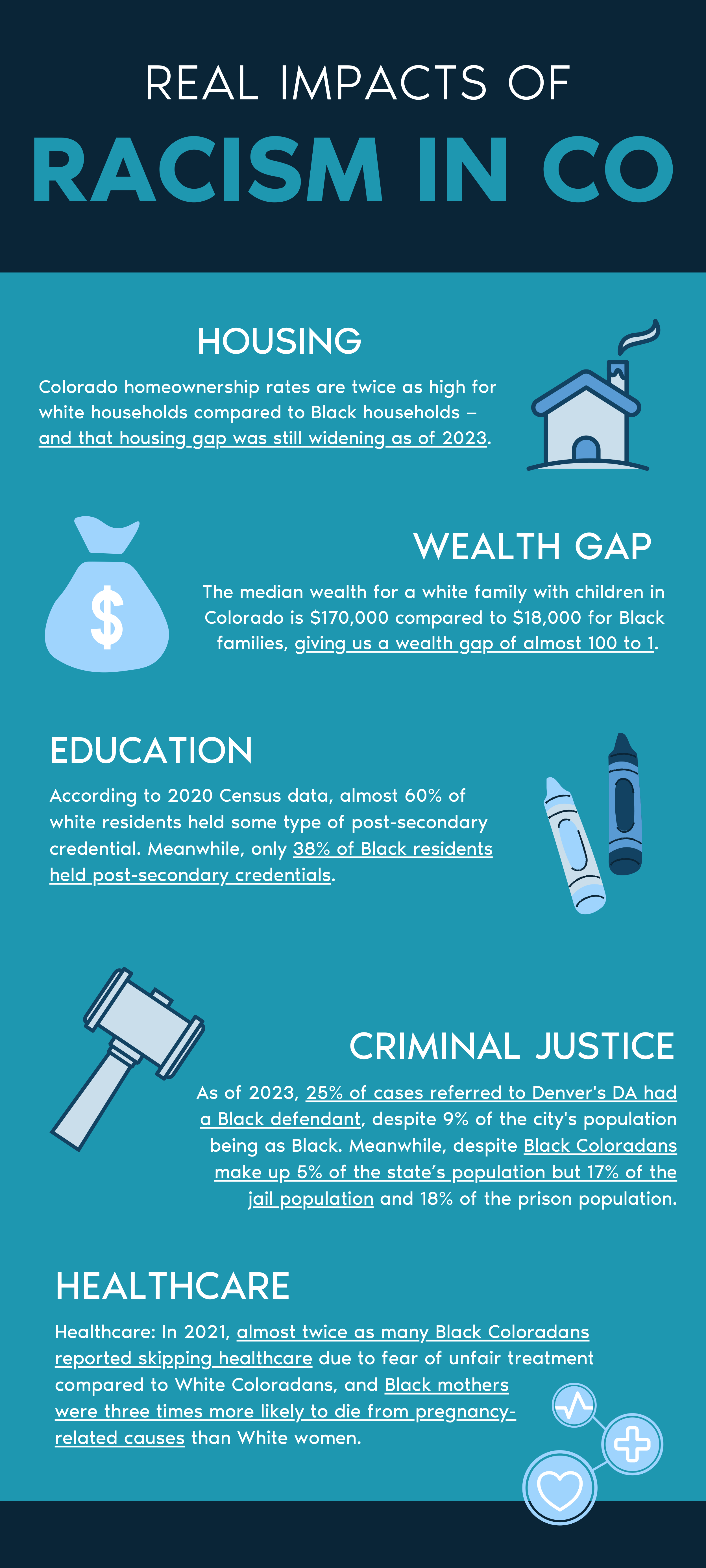 Without research qualifying and quantifying past harms in Colorado, it’s often challenging to build buy-in and momentum for systems change work. Through the lens of Sankofa, CHIC and their allies believe in the power that can be harnessed if we begin to clearly articulate the cause of these past harms at a state level. Even more, CHIC believes in the potential for solutions to emerge from this work — solutions that have evaded Coloradans for decades.
Without research qualifying and quantifying past harms in Colorado, it’s often challenging to build buy-in and momentum for systems change work. Through the lens of Sankofa, CHIC and their allies believe in the power that can be harnessed if we begin to clearly articulate the cause of these past harms at a state level. Even more, CHIC believes in the potential for solutions to emerge from this work — solutions that have evaded Coloradans for decades.
That could include housing solutions. Cooper herself spent 12 years rising through the ranks at a large banking institution. During that time, she said dozens of Black families were denied home loans — enough that she came to believe “there was no way to change that system working from within it.”
It could also include education solutions. CHIC sees the potential for these types of solutions day-in and day-out through its programmatic work. One of the leaders of that work is Noel Emerson, who established CHIC’s “Minis” program. She draws a great deal of historical wisdom from her mentor Jackie Richardson, who spent more than three decades in Colorado schools. During this time, Richardson saw Black K-12 students become 2.2 times more likely to be suspended or expelled compared to their non-Black peers.
For Richardson, that felt as though it was a direct result of systemic practices.
“We had a mandate to treat all children the same,” said Richardson, who’s now working as a family advocate in Jefferson County. “And that led to so many Black children losing trust in our education system — one that disciplined them at higher rates than their peers. We have a long way to go to rebuild that trust.”
Now, Richardson’s protege Emerson is working through CHIC to install radically different social-emotional teaching practices at Stedman and Wyatt elementary schools in Denver, both of which have large Black student populations. Richardson says the early returns on this work suggest it’s helping Black students as well as their non-Black peers.
These more individualized, full-child approaches have the full support of the U.S. Surgeon General Vivek H. Murthy, who called connection-focused practices the most effective mental health tools to address the country’s “epidemic of loneliness and isolation.”
Could scaling this kind of work at two elementary schools pay dividends for more Colorado kids and families? Better yet, where might we find the institutional will to do so? At the moment, these are open questions. Here’s what Cooper, CHIC and their allies believe they can definitively say: The current impacts of racism aren’t abstract. The five aforementioned categories — housing, the racial wealth gap, education, criminal justice and healthcare — were strategically identified for the legislative study on the basis of tangible, present and proven facts being felt by Black Coloradans.
Without deeper study of these past and present facts, CHIC suggests, we can’t identify enlightened future pathways — pathways that might not just benefit Black Coloradans, but all Coloradans.
Left: Noel Emerson poses with Stedman Elementary School students | Right: Jackie Richardson, back right, and Noel pose with Stedman Elementary School students
Photography & Design: CierraAnn Media & Mimarie Creative, Venue: Stedman Elementary School
How Might All Coloradans Benefit from the Study?
But how exactly might all Coloradans benefit from this legislative study? It’s a fair question, and one that CHIC believes has tangible answers.
Black Denverites make up 26.2% of all those experiencing homelessness in the city, according to the Metro Denver Homeless Initiative. That means finding specific solutions that are effective at helping Black Denverites rise out of poverty could help decrease the total number of those experiencing homelessness in Denver by more than 2,300 people, which would be a boon for all the city’s residents.
But could CHIC’s legislative study actually deliver those kinds of tangible impacts for Coloradans? Could the ancient African practice of Sankofa, with its focus on studying the past, actually bear fruit for our state in the present and future?
For the Black women of CHIC who are working to activate Sankofa principals in their own lives, that answer is an equally tangible yes.
“We are, in fact, our ancestor’s wildest dreams,” Cooper said. “We are not at the precipice of finally understanding and addressing the root causes of racism in Colorado without those who came before us. And we are here not because of our own strength and knowledge, but because of the fortitude and wisdom our ancestors have provided us.
“We continue to dream and work towards a brighter future. To anyone who ever felt like they couldn’t dream or imagine a different future, we’re here to say you can.”
——
Update
At the time this story was published, Colorado lawmakers were considering a bill to support CHIC’s legislative study on the present-day impacts of racism. The bill passed, paving the way for the student to commence.
Legislative Study
As of Feb. 1, CHIC’s push to pass the legislative study was progressing. Senate Bill 24-053, or the Racial Equity Study bill, passed out of its committee assignment on a 3-2 vote. Before the committee hearing, the Black Legislative Caucus hosted their own event to hear from their constituents, and they continue to work in tandem with CHIC to advance this legislation. Racial justice studies have been recognized as important tools that allow governments to qualify and quantify certain impacts of past and current racial discrimination. Cities like Albuquerque, Dallas, Minneapolis and Philadelphia as well as states like Iowa and Maryland are utilizing similar tools to better understand their own histories and generate new solutions.
Education Access
Today, just 25% of Black adults in Colorado have any credential beyond a high school diploma. This matters for two reasons: First, postsecondary credentials matter — 91.4% of Tier 1 and 70.4% of Tier 2 jobs require them. Second, for credentials to lead to economic stability and mobility, they must be earned without accompanying debt. We know now that 20 years after taking out education loans in 2003-2004, the median Black borrower still owes 95% of their total debt compared to the median white borrower, who has paid off 94% of theirs (ACLU, 2024). CHIC is now working to provide pathways to more Colorado residents who meet in-state tuition requirements to access postsecondary degree, credential or certificate programs cost-free and debt free.
Practicing Sankofa
Learn more about three of the Black women who are advocating for the legislative study, as well as the ways in which they’re enacting Sankofa practices to benefit their own lives.
Sade Cooper
Co-Founder & Chief Executive Officer, CHIC
My Studying of the Past
“The Netflix documentary Rustin centers on Dr. Martin Luther King Jr.’s right-hand man Bayard Rustin. Not only was Bayard helping Martin navigate the Civil Rights Movement, he was himself navigating the world as a gay man in the 1950s and 60s. In the film, there’s a point in one of Martin’s speeches that’s resonating with me right now. He says ‘Now is the time to bring justice back to all of God’s children.’ He’s not saying, ‘I’m ignoring Black people’s issues.’ He’s saying, ‘When we invest in everybody, we all win.’ I think people miss that. Yes, Martin was also saying, ‘We’re here for Black people,’ But it’s bigger than just Black people. What is the right, moral thing we should be doing at this moment so that we all win?”
My Present Realities
“That Dr. King quote is resonating with me right now. Not only as a social activist, but when I think about mobilization and the intricacies of building relationships — even within the Black community. How do we work to ensure we’re in one accord so that we can make moves that benefit us all? That’s what CHIC is all about.”
My Future Pathways
“I owe $102,000 of student loan debt today. As a branch manager for a bank, I saw the disparities my community faces. I’m also living proof of those disparities. And so when I think about the legislative study we proposed, it’s about helping us finally frame solutions that can prevent these issues. This $102,000 I owe is affecting my debt-to-income ratio, and that ultimately impacts my child. How do we create a world where no Black babies have to worry about going six figures into debt?”
Benny Samuels
Executive Director, Aya Foundation | CHIC Community Advisor
My Studying of the Past
“I got a job working for the Karsh Hagan ad agency right after I left college, and I realize now that Tom Hagan taught me everything I know about building personal and professional relationships. He just passed in the summer of 2023, so I’ve been thinking a lot about him and how he influenced me. He was just all-in on people. If we were doing something together, he was going to be totally himself, and he was expecting you to be totally yourself. And coming from that place on a personal level, he was OK with whatever the outcome was going to be on any professional project. He prioritized people, not projects. And I think he did that because he realized that work comes and goes — people hang around.”
My Present Realities
“I worry a lot about our Black leaders feeling alone — those doing racial justice work, those doing change work. When I was young like Sade (Cooper), I was in the fight. But now, my role within my community is just to be a soft place for these leaders to land. I actually have leaders who I go to coffee with and all they do the whole time is cuss out their frustrations. Or if someone has an important thing — like a meeting that they need to go to — and they’re a single mother, I have actually gone and picked up their kids. I’ve recently thought back about those lessons Tom gave me, and realized I have the space and ability to really prioritize people now. And so that’s what I try to do.”
My Future Pathways
“A big part of our new Aya Foundation’s mission is to focus on Black entrepreneurs. And we just gave a grant to the only Black regenerative rancher in the state of Colorado. His name is Terrance Boyd, and his family runs Wild Boyd Farm. He’s way out east of Limon in Matheson, Colo. He’s surrounded by ranchers and farmers, most of whom have inherited the land that they’re on. He bought his land and is now expanding his operation with more land, more stock, more cattle, more hens. And he’s fully embedded within that town. I think often about the great person he is, and the different perspective he’s bringing to that community.”
Noel Emerson
Re-Entry Elementary School Coordinator, CHIC
My Studying of the Past
“When I first applied for a job in Denver Public Schools, I interviewed with Jackie Richardson, and I actually missed my first two interviews with her. I’m lucky she was kind enough to schedule a third meeting with me, because she taught me everything I know. Right from the beginning, I saw that she’s got out-of-this-world empathy. She taught me that as educators we’re always planting seeds, and those seeds will grow. So if we plant seeds of discord, anger and frustration, that’s what’s going to grow inside our kids. Whenever I’m having a tough time with a student, I often have to remind myself what Miss Jackie always told me. ‘You never know what that child is dealing with when they walk into your building each morning. If you’re having a rough morning and you plant the seeds of your rough morning, that’s what’s going to grow in that child all day. As an adult, we have to channel that negative energy away from kids who don’t know how to do that yet.’”
My Present Realities
“As part of our CHIC Minis program, I love that we get to work with kids and their families. I also love that we’re able to go into the classroom and do coaching work with teachers. Sometimes, we’ll have a teacher who’s struggling with a child’s tone or energy, and I’m able to say, ‘Have you met her mom? That’s where she gets her attitude and energy, and by the way, there’s nothing wrong with it.’ So now we’ve got everyone at the table, and we can start to consider upbringing, environment and circumstances. And we can say, ‘No, she’s not being disrespectful, and it doesn’t work to penalize her because of a cultural misunderstanding. Because now she’s missing out on social time with her friends, now she’s the kid that’s always in trouble, now she’s losing respect for you as a teacher.’ We couldn’t make those cases convincingly to teachers without that holistic approach, and that’s what this program allows us to provide.”
My Future Pathways
“I was really struggling with a kid I was working with, talking to my mom and Miss Jackie crying my eyes out because I couldn’t connect with him. And they were both like, “You know, that kid might just need a hug.” I was like, ‘I’m not touching that kid!’ And they were like, ‘Just give him a hug every day before he goes home.’ I finally gave in and did it, and I’m telling you, in just a couple weeks, it was night and day. That little boy is now in high school, and I still keep in touch with his mom and grandma. They both say, ‘Something changed in him when he met you.’ It gives me so much hope that he’s got a chance to change the story for himself and his family, and that’s all because of what I learned when my network and my family leaned in for me.”
Related Stories
-
PEOPLE – Meet Ednium: The Alumni Collective
-
PEOPLE – Meet Alonso Jurado | Ednium
-
PEOPLE – Meet Kathe Traore | Ednium
- PEOPLE – Meet Richard Maez | Ednium
- PEOPLE – Meet TeRay Esquibel | Ednium
-
ORGANIZATIONS – The Savings Collaborative
- ORGANIZATIONS – Community Economic Defense Project
- ORGANIZATIONS – The Urban Land Conservancy
-
SHORT FILMS – Black Wealth Cannot Wait | Dearfield Fund
-
SHORT FILMS – Wealth Through Ownership | Apis & Heritage
-
SHORT FILMS – The Creation of Home | Dearfield Fund
